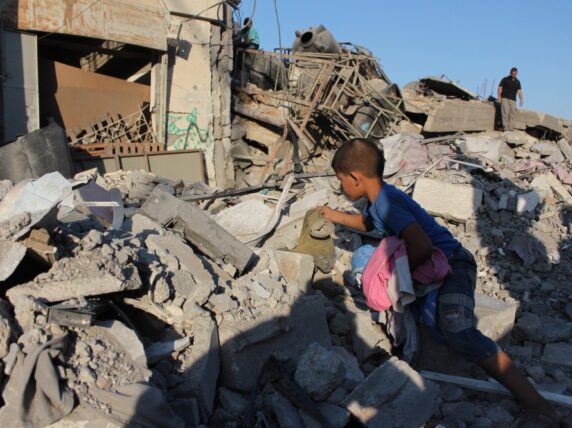What might 2023 hold for international development?
The Collins Dictionary word of 2022 was permacrisis – an extended period of instability and insecurity. It reflects the sheer number of unprecedented events happening on top of each other (although this is not new for many of the world’s population living in conflict, climate crises or poverty).
With a turbulent 2022 behind us, we can expect permacrisis to sustain this year. The only thing that we can be certain about is continued uncertainty – my watchword for 2023. Here are five questions the UK international development community is likely to ask and respond to this year.
Will we see real reform for global financial institutions?
In a world of permacrisis, it is hard not to be bleak about what the year might hold. However, I want to start with a point of optimism. The reform of our global institutions – driven by Barbadian PM Mia Mottley through the Bridgetown Agenda, is getting traction. The agenda lays out five actions which would redraw the financial system – from more concessional finance, and better use of the IMF’s reserve Special Drawing Rights, to pandemic and climate clauses in loan agreements to release liquidity in emergencies. The agenda will accelerate at a June summit, co-hosted with the French President, Emmanuel Macron and is a critical step in enabling middle and low-income countries to reduce debt burdens, and invest in climate resilience and development.
The beauty of Bridgetown is that is it very pragmatic – the asks are big but achievable. At the same time, it lays bare the extreme inequalities in the overall international system. This could drive wider reform – be that extending the National Security Council or challenging the UN charter – and give energy to the 2024 UN’s Summit of the Future – launching an entire revamp of the international system.
The agreement achieved on a Loss and Damage Fund at COP27 supports this further. Many of the financial mechanisms discussed in Bridgetown are important for getting funding to address the impacts of climate change in countries that have contributed to it the least.
What will inflation, recession and debt mean for us?
Inflation is at a multi-decade high in many countries. Recession is expected – longer in Europe due to the energy crisis, and probably more severe in the UK due to Brexit.
We will see several knock-on effects from this in 2023. The first is an increased debt burden in the countries where we work. As the federal reserve raised interest rates to deal with inflation it impacts the countries whose borrowing is linked to the dollar. This is exacerbated by rising prices so there will be less money to invest in public goods and services. As a major driver of inequality, 2023 would be a good year to redouble our efforts on debt reform. It will also be important to keep an eye on other drivers of inequality, like trade, as that element of the International Development Strategy starts to play out.
In the UK, we are already dealing with high inflation and whilst it is predicted to come down this year, underlying inflation in terms of prices and wages will persist. Organisations are seeing higher costs partly due to foreign exchange losses, as well as the need to support staff to address the increased cost of living. People are going to have less money and that will impact fundraising. Around 60% of Bond members surveyed at the end of 2022 expect the next 12 months to be worse than the last. Keeping the global and local connected through support and solidarity will be an important balancing act for 2023.
Will we get the SDGs back on track?
2023 marks the mid-point for the SDGs and this will be a major focus for the UN General Assembly in September. We are not on track to meet the SDGs by 2030, due to failures of financing to date. This must be addressed this year.
There are some reasons for optimism. There will be a major UN conference on water in March, building on the centrality of water to the other goals. This builds on the US recognising water as a major security risk. There is also a deep dive into achieving universal healthcare this year.
In terms of energy, we are nowhere near where we need to be. The vulnerabilities of a fossil fuel-based energy system have been stark in 2022. Whilst there has been a short term increase in coal, the International Energy Association (IEA) predicts that fossil fuels will start to plateau by 2025. Supply chains rather than costs are set to hold up the green revolution, though we will see progress in hydrogen and we might even get a breakthrough in nuclear fusion this year.
Climate change remains the most urgent agenda and we need more action on climate adaptation and loss and damage for those countries most affected . This should also be a year for nature in light of the recent commitment to protect 30% of our land and marine-based areas thanks to COP15.
How will the world respond to the coming and ongoing humanitarian crises?
Many of the SDGs are going in the wrong direction. We may say goodbye to the pandemic in 2023, but there are other risks like bird flu looming. The food system is failing to deliver the necessary nutrients to those at risk of famine, not to mention the long-term sustainability of agricultural systems.
There will be 339M people in humanitarian need this year (at a cost of $51.5bn), with Somalia, Ethiopia and Afghanistan at the greatest risk of deterioration. East Africa faces the worst drought in decades and economic turmoil continues to compound needs in Afghanistan. The UK will host the 2023 Ukraine Recovery Conference on June, jointly with Ukraine but it remains unclear how the war in Ukraine will play out. Will this be the year when China takes military action in Taiwan? What we do know is that several sustained conflicts are driving 80% of humanitarian need, along with climate shocks.
Early preventative measures and finance in East Africa have not been forthcoming which will drive a deeper crisis in the long run. The inadequacies of the humanitarian system will be laid bare through this famine – be it financing gaps, international supply chains, or lack of support for local action. I would like to think that this will drive preventative measures as well as cure, but the declining Official Development Assistance (ODA) in the UK and other countries does not inspire confidence that we can reset the world’s ability to support people who are permanently displaced or in crisis.
International and local humanitarian workers will continue to work against the odds, supporting people in the best ways possible with what limited resources they do have. They will also be forced to make tough decisions such as whether to work with regimes like the Taliban when core values such as gender equality are compromised and will push for more cash transfers, and support to local organisations.
How will campaigning and culture wars play out?
2023 is certainly going to be a year of mobilisation and dissatisfaction in the UK. Just Stop Oil and Extinction Rebellion will continue to take action – but expect different, more unifying tactics such as citizen assemblies over the coming months.
The UK government has responded with more punitive measures to restrict freedoms that will ensue this year – with the Public Order Bill, new guidance from the Electoral Commission and the re-emergence of the Bill of Rights. These will feed the culture wars – likely to be stoked further by a government riddled with division and at risk of losing power. We will continue to campaign to protect our civic space and right to campaign, and we will engage with those in government who are open to it.
These are my questions, what are yours? I have barely touched on UK politics. Will we get yet another Prime Minister? What our new Minister for International Development might achieve in 2023? Andrew Mitchell has already made waves in the Department in 2022, could Labour lead a progressive agenda for internationalism? Check out our Director of Policy, Advocacy and Research’s blog which delves deeper into some of this.
2023 will be a year of uncertainty, but not without opportunity. Bond also turns 30. I look forward to acting in solidarity and love with you all throughout.




